Imogen Sara Smith at Current:
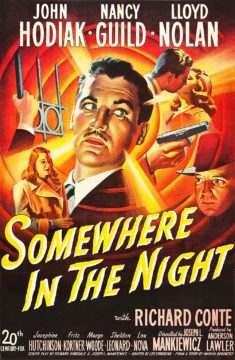 Bunker Hill was film noir’s favorite neighborhood. In the 1940s and ’50s, the once-exclusive area of downtown LA, with its rambling Victorian mansions, was attractively seedy and decaying, and supremely photogenic. The steep streets create natural Dutch angles, and the long stairways slice diagonally across the screen, vertiginous and crooked like something in a bad dream. Angels Flight, a whimsical funicular railway, is an instantly recognizable landmark. The houses have tall, narrow stoops with cagelike porch railings and flaking scrollwork, stained-glass transoms, and other emblems of scuffed and dingy grandeur. Most are cheap rooming houses, with sour, suspicious landladies and tenants whose faces and fortunes sag like the buildings. “Bunker Hill is old town, lost town, shabby town, crook town,” Raymond Chandler writes in his 1942 novel The High Window. Its tawdry charms lend flavor to Cry Danger (1951), Chicago Calling (1951), and The Turning Point (1952). In Robert Siodmak’s Criss Cross (1949), Burt Lancaster returns to his mother’s Hill Street home, convinced he has finally gotten over his ex-wife, only to immediately tumble back into the gravitational pull of their bruising relationship.
Bunker Hill was film noir’s favorite neighborhood. In the 1940s and ’50s, the once-exclusive area of downtown LA, with its rambling Victorian mansions, was attractively seedy and decaying, and supremely photogenic. The steep streets create natural Dutch angles, and the long stairways slice diagonally across the screen, vertiginous and crooked like something in a bad dream. Angels Flight, a whimsical funicular railway, is an instantly recognizable landmark. The houses have tall, narrow stoops with cagelike porch railings and flaking scrollwork, stained-glass transoms, and other emblems of scuffed and dingy grandeur. Most are cheap rooming houses, with sour, suspicious landladies and tenants whose faces and fortunes sag like the buildings. “Bunker Hill is old town, lost town, shabby town, crook town,” Raymond Chandler writes in his 1942 novel The High Window. Its tawdry charms lend flavor to Cry Danger (1951), Chicago Calling (1951), and The Turning Point (1952). In Robert Siodmak’s Criss Cross (1949), Burt Lancaster returns to his mother’s Hill Street home, convinced he has finally gotten over his ex-wife, only to immediately tumble back into the gravitational pull of their bruising relationship.
more here.

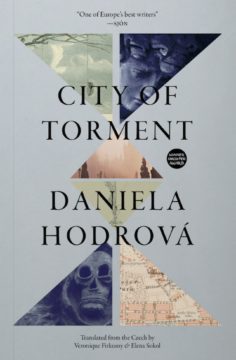 Hodrová was never associated with the dissident movement in the former Czechoslovakia, and none of her writing was published in the underground but half-tolerated samizdat form. As a scholarly woman writing in a rather recondite literary tradition, she probably wasn’t taken very seriously by more “political” (male) authors, and she didn’t really care for them either, it seems. As it turns out, all this has stood her in good stead. The many “banned authors” of the ’60s, ’70s, and ’80s were finally published in the early 1990s — and then the world basically lost interest in them, paving the way for “new voices” to emerge, including Hodrová’s. After she was awarded the Kafka Prize, whose winners include the likes of Harold Pinter and Margaret Atwood, Hodrová has even been proposed a few times to the Nobel Committee.
Hodrová was never associated with the dissident movement in the former Czechoslovakia, and none of her writing was published in the underground but half-tolerated samizdat form. As a scholarly woman writing in a rather recondite literary tradition, she probably wasn’t taken very seriously by more “political” (male) authors, and she didn’t really care for them either, it seems. As it turns out, all this has stood her in good stead. The many “banned authors” of the ’60s, ’70s, and ’80s were finally published in the early 1990s — and then the world basically lost interest in them, paving the way for “new voices” to emerge, including Hodrová’s. After she was awarded the Kafka Prize, whose winners include the likes of Harold Pinter and Margaret Atwood, Hodrová has even been proposed a few times to the Nobel Committee. THE ACT OF
THE ACT OF Legendary jazz singer Billie Holiday’s autobiography is considered an American classic. Co-written with author and journalist William Dufty at a point when much had already been written about her, it is titled Lady Sings the Blues.
Legendary jazz singer Billie Holiday’s autobiography is considered an American classic. Co-written with author and journalist William Dufty at a point when much had already been written about her, it is titled Lady Sings the Blues.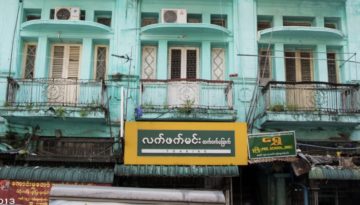 Travel is, deep down, an exercise in trust, and sometimes I think it was you who became my life’s most enduring teacher. I had every reason to be wary when, in 1985, I clambered out of the overnight train and stepped out into the October sunshine of Mandalay, blinking amidst the dust and bustle of the “City of Kings.” I wasn’t reassured as you sprang out of the rickety bicycle trishaw in which you’d been sleeping, as you did every night, and I don’t think the signs along the sides of your vehicle — b.sc. (maths) and my life — put my mind very much to rest.
Travel is, deep down, an exercise in trust, and sometimes I think it was you who became my life’s most enduring teacher. I had every reason to be wary when, in 1985, I clambered out of the overnight train and stepped out into the October sunshine of Mandalay, blinking amidst the dust and bustle of the “City of Kings.” I wasn’t reassured as you sprang out of the rickety bicycle trishaw in which you’d been sleeping, as you did every night, and I don’t think the signs along the sides of your vehicle — b.sc. (maths) and my life — put my mind very much to rest. In case you had not noticed, computers are hot—literally. A laptop can pump out thigh-baking heat, while data centers consume an estimated 200 terawatt-hours each year—comparable to the energy consumption of some medium-sized countries. The carbon footprint of information and communication technologies as a whole is close to that of fuel use in the aviation industry. And as computer circuitry gets ever smaller and more densely packed, it becomes more prone to melting from the energy it dissipates as heat.
In case you had not noticed, computers are hot—literally. A laptop can pump out thigh-baking heat, while data centers consume an estimated 200 terawatt-hours each year—comparable to the energy consumption of some medium-sized countries. The carbon footprint of information and communication technologies as a whole is close to that of fuel use in the aviation industry. And as computer circuitry gets ever smaller and more densely packed, it becomes more prone to melting from the energy it dissipates as heat.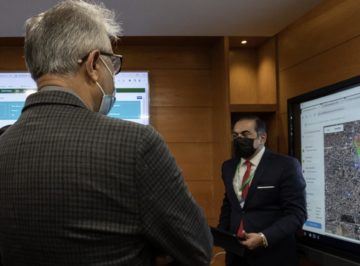 Thousands of health workers around the world hunt for polio in two ways: By looking for signs of acute flaccid paralysis in children and testing the environment for the presence of the virus. In Pakistan, for the first time ever, both sets of data look promising: There hasn’t been a single child paralyzed by wild poliovirus in more than a year or any virus detected in the environment in more than two months.
Thousands of health workers around the world hunt for polio in two ways: By looking for signs of acute flaccid paralysis in children and testing the environment for the presence of the virus. In Pakistan, for the first time ever, both sets of data look promising: There hasn’t been a single child paralyzed by wild poliovirus in more than a year or any virus detected in the environment in more than two months.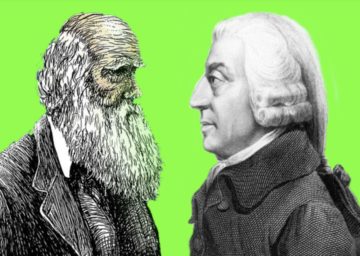 DSW: Greetings, Dennis! I look forward to discussing the backstory of our article. Let’s begin with how we met, which says a lot about the need for paradigmatic change. It was a workshop organized by a major foundation to explore how to go beyond neoclassical economics. The participants were drawn from a number of academic disciplines such as law, political science, and sociology in addition to economics. Each discipline had its own table, so the layout of the room reflected the siloed nature of the disciplines. I was the only person with evolutionary training, so I was assigned to the sociology table. That’s ironic, because sociology is even further behind economics in embracing evolutionary science.
DSW: Greetings, Dennis! I look forward to discussing the backstory of our article. Let’s begin with how we met, which says a lot about the need for paradigmatic change. It was a workshop organized by a major foundation to explore how to go beyond neoclassical economics. The participants were drawn from a number of academic disciplines such as law, political science, and sociology in addition to economics. Each discipline had its own table, so the layout of the room reflected the siloed nature of the disciplines. I was the only person with evolutionary training, so I was assigned to the sociology table. That’s ironic, because sociology is even further behind economics in embracing evolutionary science. In 2019, a senior colleague warned me that my research focus was a niche area of a frivolous topic: conspiracy theories related to vaccine hesitancy among parents in Ireland.
In 2019, a senior colleague warned me that my research focus was a niche area of a frivolous topic: conspiracy theories related to vaccine hesitancy among parents in Ireland. One hundred percent democracy sounds like a grade someone has achieved in a course—and we would like to believe that our American system can be remade to live up to its promise and become worthy of such acclaim.
One hundred percent democracy sounds like a grade someone has achieved in a course—and we would like to believe that our American system can be remade to live up to its promise and become worthy of such acclaim. Parrots are famous for their remarkable cognitive abilities and exceptionally long lifespans. Now, a study led by Max Planck researchers has shown that one of these traits has likely been caused by the other. By examining 217 parrot species, the researchers revealed that species such as the scarlet macaw and sulfur-crested cockatoo have extremely long average lifespans, of up to 30 years, which are usually seen only in large birds. Further, they demonstrated a possible cause for these long lifespans: large relative brain size. The study is the first to show a link between brain size and lifespan in parrots, suggesting that increased cognitive ability may have helped parrots to navigate threats in their environment and to enjoy longer lives.
Parrots are famous for their remarkable cognitive abilities and exceptionally long lifespans. Now, a study led by Max Planck researchers has shown that one of these traits has likely been caused by the other. By examining 217 parrot species, the researchers revealed that species such as the scarlet macaw and sulfur-crested cockatoo have extremely long average lifespans, of up to 30 years, which are usually seen only in large birds. Further, they demonstrated a possible cause for these long lifespans: large relative brain size. The study is the first to show a link between brain size and lifespan in parrots, suggesting that increased cognitive ability may have helped parrots to navigate threats in their environment and to enjoy longer lives. Forgiveness is often viewed as the “happily ever after” ending in a story of wrongdoing or injustice. Someone enacts harm, the typical arc goes, but eventually sees the error of their ways and offers a heartfelt apology. “Can you ever forgive me?” Then you, the hurt person, are faced with a choice: Show them mercy — granting yourself peace in the process — or hold a grudge forever. The choice is yours, and it’s one many of us assume starts with remorse and a plea for grace.
Forgiveness is often viewed as the “happily ever after” ending in a story of wrongdoing or injustice. Someone enacts harm, the typical arc goes, but eventually sees the error of their ways and offers a heartfelt apology. “Can you ever forgive me?” Then you, the hurt person, are faced with a choice: Show them mercy — granting yourself peace in the process — or hold a grudge forever. The choice is yours, and it’s one many of us assume starts with remorse and a plea for grace.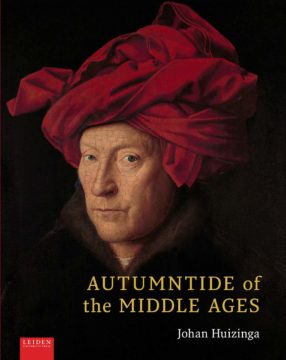 Although Autumntide may seem ornately literary today, when it was first published, some historians criticized its racy readability. Otto Oppermann, a German-Dutch medievalist who taught at Utrecht, referred to the book as “Huizinga’s crime novel,” implying that it was all too vivid an experience.
Although Autumntide may seem ornately literary today, when it was first published, some historians criticized its racy readability. Otto Oppermann, a German-Dutch medievalist who taught at Utrecht, referred to the book as “Huizinga’s crime novel,” implying that it was all too vivid an experience. This sort of loss, with its confluence of profligacy and jackassery, is a common feature of architectural history. Any speculator who demolishes Geller I to build a tennis court is assuredly some sort of villain, but the villainy is also of a system within which such actions can seem rational and normal. Even after the housing bubble and Great Recession, sometimes fantastical speculation in the material value of private houses and their half-acres of land remains the seeming consolation for the compounding economic injustices of our new Gilded Age—especially for the middle classes, for whom their dwelling place is their main financial asset. I’m reminded of Walt Whitman’s father—also a Long Island house-flipper and land speculator—remembered in There was a Child Went Forth as a master of “the blow . . . the tight bargain, the crafty lure.” The transactionality of those encounters colonized the consciousness of the poet inseparably from “the streets themselves, and the façades of the houses. . . . the goods in the windows.”
This sort of loss, with its confluence of profligacy and jackassery, is a common feature of architectural history. Any speculator who demolishes Geller I to build a tennis court is assuredly some sort of villain, but the villainy is also of a system within which such actions can seem rational and normal. Even after the housing bubble and Great Recession, sometimes fantastical speculation in the material value of private houses and their half-acres of land remains the seeming consolation for the compounding economic injustices of our new Gilded Age—especially for the middle classes, for whom their dwelling place is their main financial asset. I’m reminded of Walt Whitman’s father—also a Long Island house-flipper and land speculator—remembered in There was a Child Went Forth as a master of “the blow . . . the tight bargain, the crafty lure.” The transactionality of those encounters colonized the consciousness of the poet inseparably from “the streets themselves, and the façades of the houses. . . . the goods in the windows.”